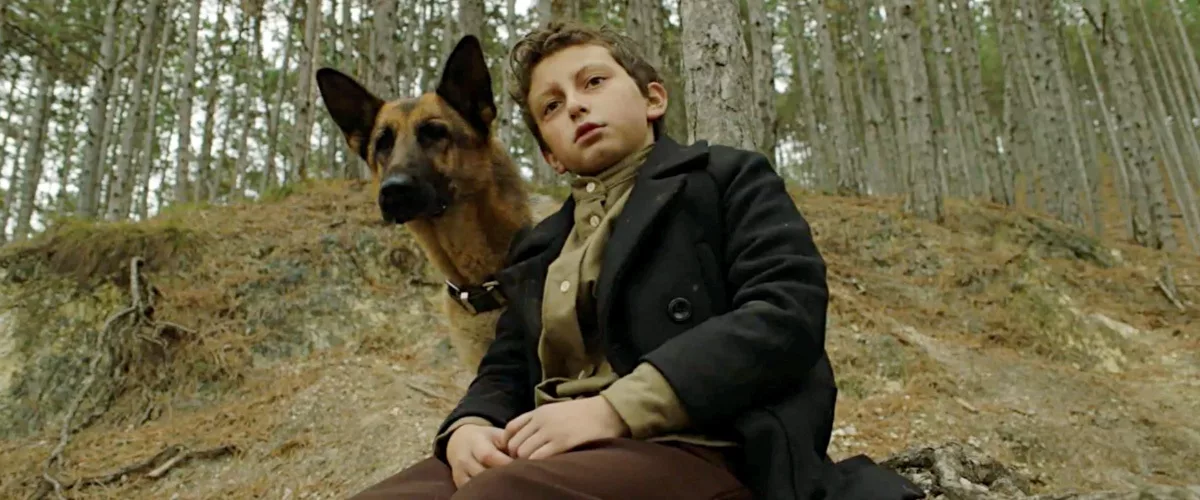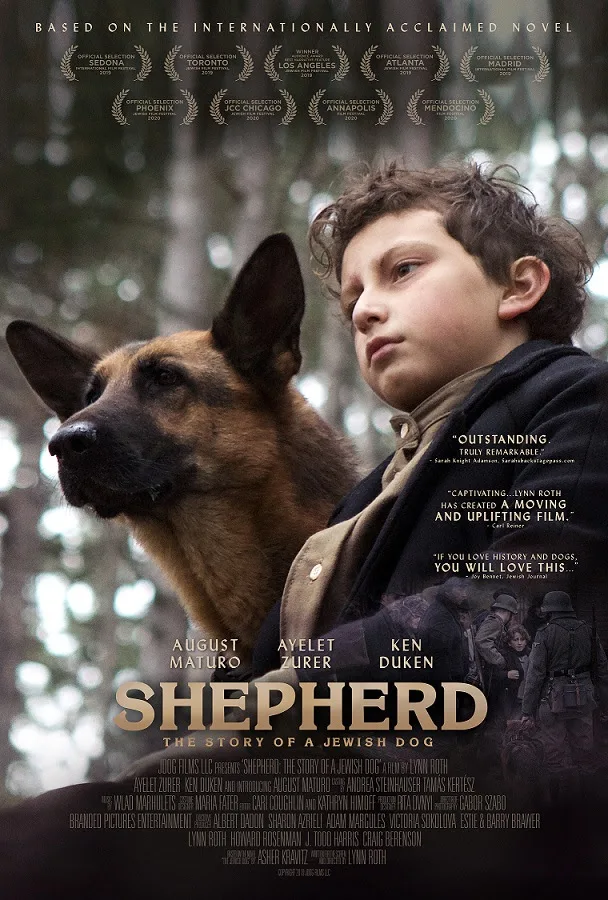It is unambiguously upsetting to learn that, among the many inhumane restrictions placed on them by the Nazi regime during the Holocaust, Jewish people were forbidden to have animal companions and that dogs were trained by the perpetrators to aid them in evil. Lynn Roth’s “Shepherd: The Story of a Jewish Dog” focuses on these pets, specifically dogs, and their role during the war. The film, unfortunately, is poorly acted and offers Hallmark Channel-level craftsmanship.
Adapted from Asher Kravitz’s novel Jewish Dog, the movie opens with the birth of a litter of German shepherd puppies inside a Jewish family’s home in 1930s Germany. The children, in particular the young Joshua (August Maturo), take a liking to one of the male dogs, which their father names Caleb. As their new friend grows, the political climate in the country begins shifting and the first signs of anti-Semitism take hold.
An early scene shows the mother and her two kids about to enter a shop but stopping upon seeing two signs in the storefront, one that reads “No Dogs Allowed,” and just above that another one with the legend, “No Jews Allowed.”
Roth’s strongest, but definitely on-the-nose point uses the dogs to speak of the dehumanization of the Jewish people and how the Nazi’s obsession with racial purity extended to animals. As the father tries to sell some of their dogs, a blond German man questions him about the breed of the animals. Later, after the family is separated, and the plot reunites Caleb and Joshua inside the same concentration camp, the notion of animalistic behavior is employed to refer to the SS officers.
Shot in Hungary with an international cast, the production feels bizarrely put together. Its budget appears substantial enough to secure locations and/or sets that convincingly convey the desired illusion of the historical period, and yet the flat lighting and generic score makes it aesthetically amateurish. It’s as if every resident of a small town got together to reenact scenes and shoot them with the best equipment they could get their hands on, but in the end the lack of professional creativity shows through.
Nonetheless, the stale form isn’t the most disappointing variable of this barely competent work, but the performances that border on cartoonish. An inconsistent and honestly risible array of accents, that clearly don’t respond to any one nationality or region, only play against the already platitudinous writing.
Maturo (from Disney Channel’s “Girl Meets World”), the young actor driving this clunky dramatic vehicle, nails a few of the less emotional scenes. But for the most part, and likely due to the direction, he falls prey to overacting in those moments that require him to cry or deliver a furious speech. In the hands of a more adroit filmmaker, he might be able to modulate the emotion for a more believable outcome.
The touchstones that Roth hits in the screenplay actually move the story forward in an interesting way. But the larger, aforementioned setbacks overshadow what’s truly a journey from Caleb’s vantage point as he changes masters, transforms into a weapon for villainous dog trainer Ralph (Ken Duken, the most measured actor in the entire movie), and eventually remembers who he was before the conflict. In the final act, the dog aims to fulfill his namesake, trying to lead Joshua and other Jewish prisoners out of their chains and into freedom again.
Roth’s film is at its best when the dogs are left alone to roam the city and interact with each other without the intrusion of any humans. These early sequences when Caleb leads a pack of street canines are far from revolutionary, but at least bring a pinch subtly to such heavy-handed drama. Notably, the remarkable training of all the dogs in front of the camera stands as an achievement. Without it nothing would land; it was a sage move to make it a priority.
The use of black-and-white flashbacks to the dog’s memories of his days with a loving family is a harmless idea in hopes of making the voiceless character more personable, but their implementation rings cheap. Last year the animated feature “Marona’s Fantastic Tale” handled similar ideas but with far more finesse and introspection. That’s a surely better choice for a family friendly tale that highlights a dog’s soul and its relationship to humans’ need for companionship. Somewhere in another dimension, there’s a better version of this genuinely fascinating, animal-centric footnote of World War II, but Roth’s rendition barks loudly and artlessly at every wrong tree.
Now playing in theaters.




















